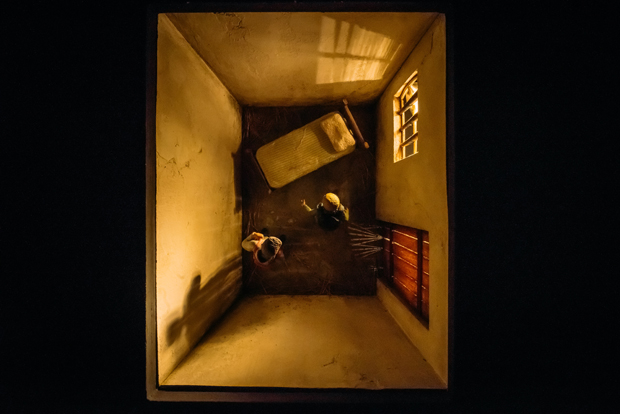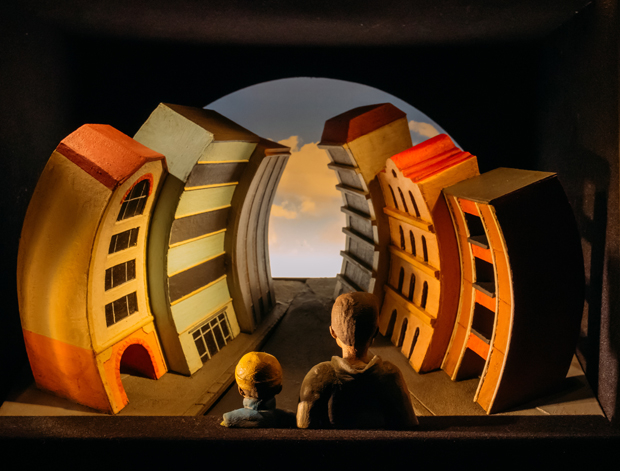Flight Takes Audiences on a Harrowing Journey Across Europe

(© Mihaela Bodlovic)
The protagonists of Flight wouldn't be able to see the show. Even if a kind stranger bought them tickets, they wouldn't make it past the ID scanner at the front door of the McKittrick Hotel, because they have nothing to scan — no passports or state IDs. Nothing. Hard as it is for us to imagine in the document-centric West, this is the reality for billions of people, perhaps the majority. Scotland-based theater company Vox Motus puts us in their shoes with Flight, a theatrical installation that is both ingeniously rendered and heartfelt.
Based on Caroline Brothers's page-turner of a novel, Hinterland, the story follows brothers Aryan (Farshid Rokey) and Kabir (Nalini Chetty), who flee their home in war-torn Afghanistan for the promise of a new life in England. Aryan is 14 and Kabir is just 8, but they manage to travel across Iran, Turkey, Greece, Italy, and France through sheer determination and the kindness of strangers. But strangers can be exceedingly cruel too, especially when they know that Aryan and Kabir have no way of fighting back, and no papers to prove that they even exist.
Surprisingly, the actors noted above are not actually performing in front of us. Instead, this story is told completely through miniature figurines on a rotating diorama, with recorded voices transmitted to us through headphones. Designed by Jamie Harrison and Rebecca Hamilton, hundreds of handmade models appear in exquisitely detailed frames, each depicting a beat in the story. Simon Wilkinson lights over 200 boxes to correspond with Mark Melville's jarringly intimate binaural audio design. It's like seeing a three-dimensional graphic novel that comes with an accompanying radio drama.
As if that weren't complicated enough, each audience member sits in an individual booth around the central carousel that houses the light boxes, meaning that we're all at a different point in the story at any given moment. Storyboard artist Kenneth MacLeod has impressively mapped out the narrative from every angle, with the lighting and audio perfectly synchronized with the rotation of this puzzle box. Under the thoughtful direction of Jamie Harrison and Candice Edmunds, Flight is a work of breathtaking complexity that also manages to be deeply moving.

(© Mihaela Bodlovic)
The voice actors are a big part of that. As Aryan, Rokey exudes an adolescent hopefulness that is tempered by a cautious catch in his voice. The responsibility for his younger brother weighs on his diction, and we can hear his heart pounding in his throat when he thinks he's lost him. Chetty undergoes a marked transformation during the play, with her voice darkening from childlike mischief to adult gravity as Kabir grows up on the road.
Playwright Oliver Emanuel has economically adapted the novel, neatly fitting the story into 50 minutes. He steadfastly avoids any details of Aryan and Kabir's life in Afghanistan, which has the benefit of cutting off the asinine debate about who deserves refuge and who does not. These two boys travel across much of Eurasia, often on foot. They're clearly running from something terrible.
Not all of Vox Motus's contrivances are that clever. The French police are depicted as a flock of noisy seagulls, an evocative choice that disappointingly ignores the human complicity in Aryan and Kabir's oppression. Every year, Western taxpayers spend billions of dollars to keep people like Aryan and Kabir out of their countries, and Western police sometimes use violence to carry out that directive. We shouldn't be able to just blame it all on the birds.
Hopefully, the next time you hear someone remark that undocumented immigrants ought to "get in line" and "follow the process," you'll remember Aryan and Kabir, and how there is no line for them. This may not matter to some, but those people ought to explain why it is justified that children should be forced to live in a war zone just because they were born there.










